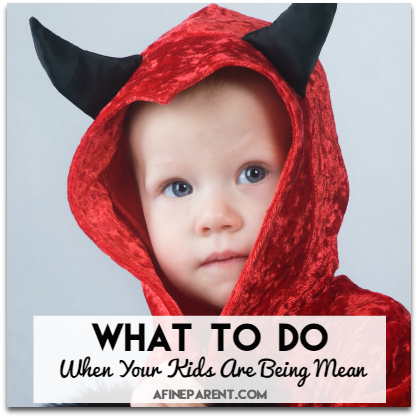 Have your kids ever said something so unexpectedly mean that it made you recoil with horror?
Have your kids ever said something so unexpectedly mean that it made you recoil with horror?
When our second daughter, Claire, was born, it was immediately clear that Sarah, our first born, was not a fan.
She put on a good show initially – at least as a good a show as you can when you’re 2-1/2 and your world has been turned upside down. She claimed to love the baby; she would pat Claire’s head, try to feed her Cheerios and read her board books in a high-pitched, sing-songy voice.
Soon these charitable acts were interspersed with minor acts of terrorism. Pinching. Yelling. Failed attempts to tip over Claire in her baby bouncer.
I couldn’t leave the two of them alone in a room. All of my pleas to Sarah to love her sister fell on deaf ears. I envisioned a future where my home looked more like a war zone filled with mean kids than the peaceful, compassionate haven of my dreams.
The low moment came one day when Claire was napping.
Sarah was keeping me company in the kitchen while I cleaned up from lunch. As I wiped down the highchair tray, Sarah wrinkled her nose and suggested that the baby was way too messy. In the broken English employed by three-year-olds, she confided in me that the solution was to take that baby, dump her in the garbage and watch her “head crack open like an egg.”
This was the solution my three-year-old offered me to put an end to messy highchair trays, forever!
I don’t think I can fully capture the horror of the moment.
How could my sweet little angel say such a thing?
How could she be – I could barely summon the word – so MEAN?
The Words that Make Us Recoil in Horror
Have you been there? It takes you completely by surprise doesn’t it?
From the ubiquitous “I hate you, mama” to “I don’t like her skin, it’s so brown,” there are the words that pour out of our kids’ beautiful mouths, turn our stomachs and rip our hearts right out of our chest.
If you’re a reader of A Fine Parent, then you’re a caring person. I know that, without ever having met you. You want to be the best possible parent you can. You want to raise kind and compassionate kids in this narcissistic, self-absorbed world.
So when we hear this kind of language from our kids, when our little angels behave like such mean kids, we can’t help but feel deeply shaken up. We’re convinced we’ve failed.
And our instinctive response is to strike right back, to scold and punish, to make sure we never hear that kind of talk from them again.
But that’s absolutely the worst thing to do. Because it’s at moments like these that our kids need us to be at our best, at our kindest and most loving.
These are the moments when our kids need us the most.
Setting aside our inner shame (because we are ashamed, aren’t we?) and finding a way to show loving-kindness to our kids at their worst is one of the best methods I know for rearing caring, compassionate adults.
Because it’s at these ugly moments that we must remember a vital life lesson: It’s not about us. It’s about them. And how we help them recover their sense of innate goodness.
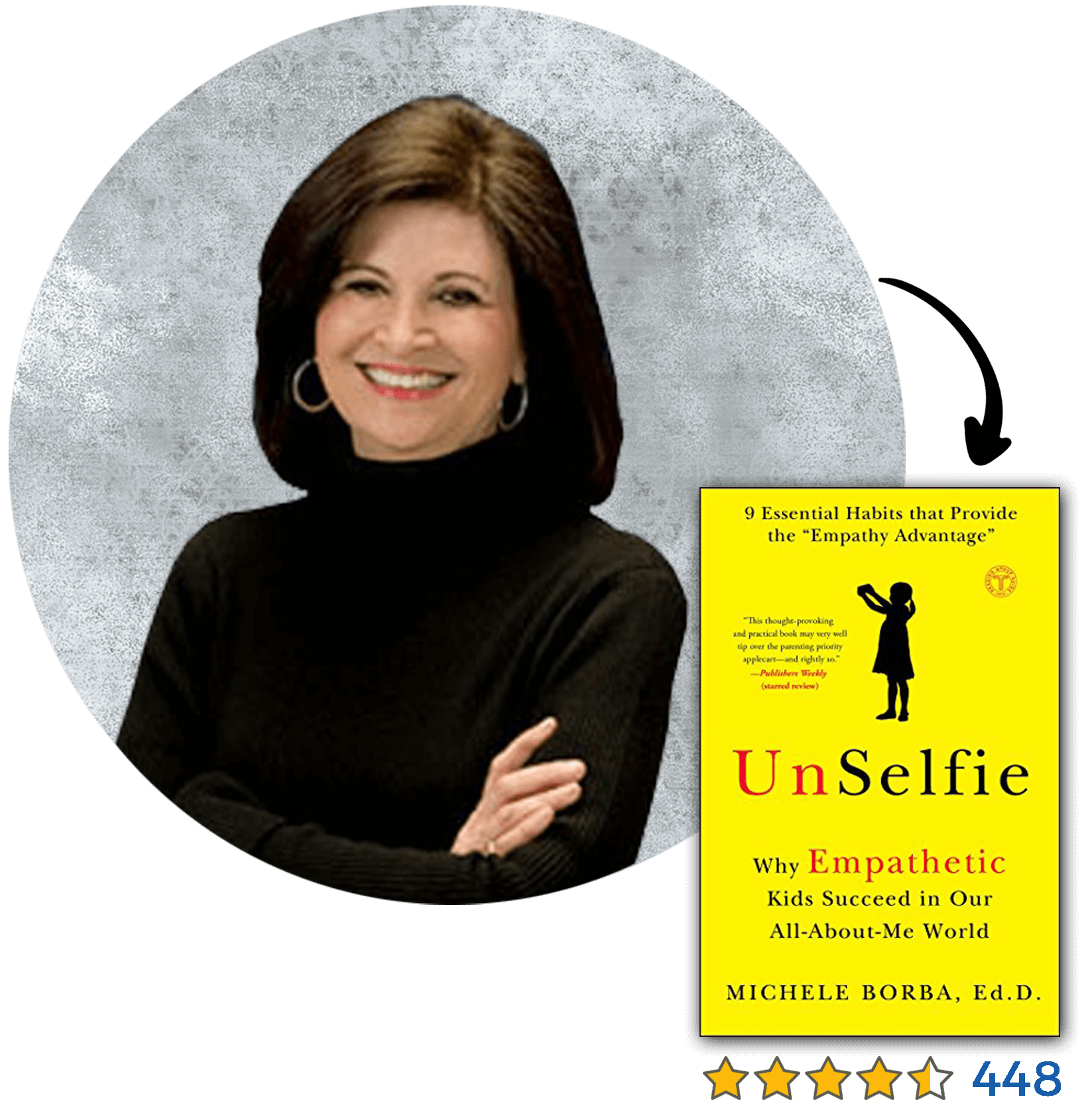 Do you worry that your child seems mean? Dr. Borba, globally-recognized educational psychologist, former teacher, and award-winning expert and author, says that empathy is what will give a distinct advantage for people to succeed–both at life and career– in the future we are headed into. We’ve partnered with Dr. Borba to create the “Raising Empathetic Kids” Masterclass that gives you tons of practical tips you can start using right now!
Do you worry that your child seems mean? Dr. Borba, globally-recognized educational psychologist, former teacher, and award-winning expert and author, says that empathy is what will give a distinct advantage for people to succeed–both at life and career– in the future we are headed into. We’ve partnered with Dr. Borba to create the “Raising Empathetic Kids” Masterclass that gives you tons of practical tips you can start using right now!
This packed masterclass is one of the 60+ masterclasses you get when you join the AFineParent Academy today. Click here to learn more.
Love Gets the Message Across
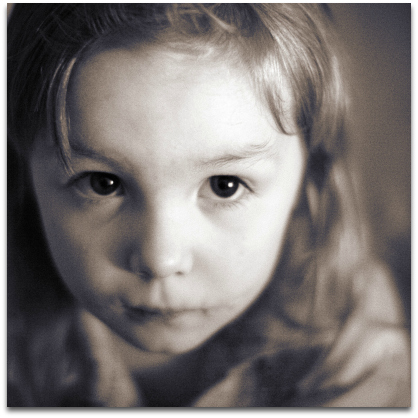 So here we are, back in my kitchen years ago, where I held a damp washcloth in my hand and gaped in bewilderment at my daughter.
So here we are, back in my kitchen years ago, where I held a damp washcloth in my hand and gaped in bewilderment at my daughter.
Now that she’d turned my world upside down, Sarah waited for my response.
As I looked down at her and saw her little brow furrow with concern and her eyelids tremble with tears, even as she chuckled anxiously at her “joke,” I had a breakthrough.
I realized she had just confessed her very deepest, darkest secret to me: she wanted Claire to go away because she was no longer confident of her own place in the family.
And who could blame her? From Sarah’s perspective, I was giving all my love and attention to the baby. Overnight my expectations of her had changed. (After all, she was the big kid now!) I was short-tempered and sharp of voice where once I had been patience itself.
And as I remembered all the times I had felt unloved and unwanted myself, my heart broke, just a little.
I finally knew what to do.
I sat down on the floor and pulled Sarah into my lap. I kissed her cheek and smoothed her hair; I said gently, “So you want to put the baby in the garbage and watch her head crack open like an egg.”
Yes, Sarah confirmed. That was exactly right. Then she relaxed against my chest and asked if I would read her a book.
For a moment I’d walked in the tiny shoes of my beloved first born and realized how much of her acting out came from a place of pain and confusion.
I began spending more time with Sarah when Claire took naps or when her dad came home in the evening. I stopped telling her how she was supposed to feel and eventually love grew in Sarah’s little heart all on its own. Being compassionate toward this itty-bitty person — who occupied such major real estate in my heart – definitely moved the process along.
It was only a few months later that I started to find Sarah in Claire’s crib in the morning, the two nestled in a heap like puppies, and felt joy like no other instead of terror. As the years passed I’d listen to them giggle after bedtime in the room they shared, chattering in a language that I barely understood but was perfectly clear to them. They walked to school together, defended each other during dustups at recess, toiled through homework side-by-side at the kitchen table.
No, they don’t always get along. But they do know how to love each other.
5 Preventative Tips to Ensure You are Not Raising Mean Kids
1. Unconditional love is the greatest teacher
Be sure your child feels loved and accepted — it’s the best way for them to learn how to show kindness and compassion to others.
Sounds easy? Good grief; no. It’s the most difficult challenge every parent has to face.
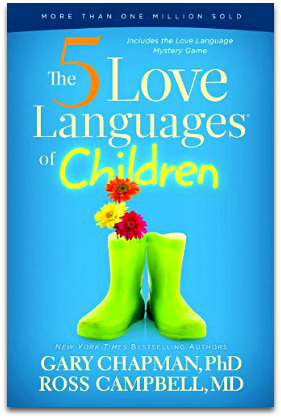 That’s why I highly recommend The Five Love Languages series. These gentle books overflow with insights into loving children in the way that makes sense to them.
That’s why I highly recommend The Five Love Languages series. These gentle books overflow with insights into loving children in the way that makes sense to them.
Being attentive to their cues makes your love feel concrete and gives them the emotional elbowroom they need to flourish. I could not have raised our daughters without these books piled up on my nightstand. No kidding.
Best of all, the author is also exceedingly compassionate towards parents. Dr. Chapman pretty much raised me too.
- The 5 Love Languages of Children
- The 5 Love Languages of Teenagers
- The 5 Love Languages: The Secret to Love That Lasts
(for adults in a relationship)
Sometimes giving that lavish love is hard, if there’s a temperamental difference between you and your child or your child just has a more complex, intense personality (e.g., highly sensitive, given a diagnosis of ADHD or appears to thrive on being contrary). If that is the case, check out some of these books as well.
2. Walk the walk and talk the talk
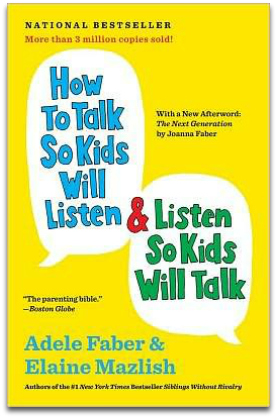 Kids are like sponges; they soak up what’s around them, without a filter, and that means they’re getting the bad as well as the good. So what are you modeling, exactly? What’s coming out of your mouth, and are you happy about it?
Kids are like sponges; they soak up what’s around them, without a filter, and that means they’re getting the bad as well as the good. So what are you modeling, exactly? What’s coming out of your mouth, and are you happy about it?
The gold standard for respectful conversation between children and parents is Faber and Mazlish’s How to Talk So Kids Will Listen & Listen So Kids Will Talk
But a lesser-known series is also indispensible for learning to talk in ways that brings people together instead of drawing lines in the sand.
- Crucial Conversations Tools for Talking When Stakes Are High
- Difficult Conversations: How to Discuss What Matters Most
3. Protect your children from burnout and desensitization
One of the most unexpected lessons about raising nice kids is that self-care is an important component. Think about how we feel when we’ve been stretched to the limit. It’s pretty easy to snap, isn’t it? Kids are no different.
Part of that is giving your children a safe place to grow up, a refuge from all the nastiness that’s rampant in our larger culture.
Let your kids be kids.
Allow them to grow into compassion and kindness at a developmentally appropriate rate. Protect them from as much ugliness as possible.
Start with small steps; there’s no way they can process global disease and poverty without being scared or traumatized. Have them practice by loving you, Grandma and the gray tabby cat next door.
An important factor to avoid burnout while they learn to be compassionate is to understand the difference between empathy and compassion. I liked this article from the Greater Good that lays out the difference so much that I’ve dropped the “e” word from my vocabulary entirely:
When we witness suffering and distress in others, our natural tendency to empathize can bring us vicarious pain. Is there a better way of approaching distress in other people? A recent study, published in the journal Cerebral Cortex, suggests that we can better cope with others’ negative emotions by strengthening our own compassion skills, which the researchers define as “feeling concern for another’s suffering and desiring to enhance that individual’s welfare.”
Compassion allows you to care for the wellbeing of others without forsaking your own mental well being in the process, which is critical to avoid desensitization.
4. Get a pet
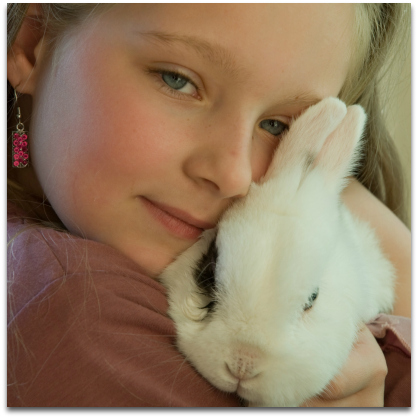 Before you panic, I don’t mean taking on a responsibility that feels overwhelming to YOU. I’m someone who, in the words of my doctor, is allergic to “all living things.” So we relied on small birds and dozens of adorable rodents (mice, gerbils, hamsters, etc.) whose dander could be contained in a cage, much to the gratitude of my lungs and sinuses.
Before you panic, I don’t mean taking on a responsibility that feels overwhelming to YOU. I’m someone who, in the words of my doctor, is allergic to “all living things.” So we relied on small birds and dozens of adorable rodents (mice, gerbils, hamsters, etc.) whose dander could be contained in a cage, much to the gratitude of my lungs and sinuses.
But even these tiny family members gave our daughters valuable experience in tending for other living beings — especially learning patience in light of the demands of critters that don’t necessarily express much gratitude in return. We have a veritable pet cemetery in our backyard, and genuine tears were shed at the service performed over each shoebox. (This article from Parents talks about the other benefits of pets beyond growing soft hearts.)
5. Be very selective about media
This is really dangerous territory, I think. Even shows and movies advertised as “kid-friendly” can offer pretty shocking models for behavior. We had to ban the seemingly innocuous TV sitcom “Full House” because the girls began to call each other names, inspired by the way the Tanner girls talked. There was no laugh track at our house when the word “stupid” was thrown around with way too much abandon.
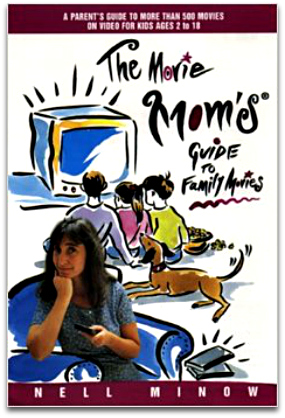 You’ll also want to be cautious about what you watch and listen to while your children are within earshot. And the evening news isn’t good for anyone, frankly, given how it typically distorts actual events in favor of the sensational and the salacious.
You’ll also want to be cautious about what you watch and listen to while your children are within earshot. And the evening news isn’t good for anyone, frankly, given how it typically distorts actual events in favor of the sensational and the salacious.
There are several sites available to help you make thoughtful choices about family movies:
The Movie Mom (aka Nell Minow) also has a fabulous book by the same name that I highly recommend. My copy is full of dog-eared pages and copious notes; you’d have to pry it out of my fingers before I ever gave it up. It’s a great resource on classic movies that should be part of every childhood and helps kids become discerning consumers of media at the same time.
- Common Sense Media also rates apps and games in addition to movies.
And by all means, make sure your kids are relating to human beings as much as possible and not to devices by limiting their technology consumption.
The 2-Minute Action Plan for Fine Parents
This is an eye-opening topic for many of us, because coming to grips with how we talk and behave can be devastating. It’s tough to look at yourself in the mirror and figure out those moments when you weren’t even in the same room as nice. You were just plain mean.
You can’t do a total overhaul right now, but you can pinpoint some small changes to implement immediately.
Do a debriefing on what compassion looks like in your family. What do you think you’re doing right? What could you do better? And what would you like to change?
If you’re struggling to see where you are in this journey, try to paint a word picture. What do you think compassion looks like? Feels like? What’s easiest for you to do to be compassionate? Hardest? Where do you need support? What do you want to start doing right now? What do you want to stop doing?
The Ongoing Action Plan for Fine Parents
Make a pact to be intentional about how you model compassion for your children and what you expose them to along the way. If your family had a mission statement, what would it be? And how will your decision-making process (purchases, events, etc.) support that desire to be a family that puts compassion first? A united front is important, as is a spirit of forgiveness and flexibility.
Mistakes will be made; that’s a guarantee. Compassionate people know to dust themselves off and try again.
Wow. You are an excellent writer. Your daughter’s words took my breath away. But you are right. It is clear she was experiencing alienation and you did the right thing to gather her close. It is like they say, we need love most when we least deserve it. Funny how that works. I had a somewhat similar experience when my niece complained about my daughter and told me she wanted to fight her in very unpleasant language. I had to be silent for at least a moment while I realized that she was just jealous and wanted to be loved too. That silence was invaluable to keep me from responding in shocking ways of my own.
This morning I volunteered in our church nursery – my group consisted of seven kids ages two to four… While that sounds like a small group – it hands on every second just to maintain safety and keep the kids from climbing up the cabinets!! We were two adults in the room and here I am looking at “what’s up with little kids…”. Is it human nature, social stimulus, passive parenting – or am I too old and out of touch with the new reality today?? We have six grandkids – our youngest is 16 and never witnessed “herd” behaviors of the worst kind!
Love this article and all the comments
This is such a good read. The first thing I’ve taught my son was to be kind.
Love the article. Sometimes is hard to be compassionate to your kids especially if its looked down upon in your culture. And if you are raised seeing that the parents with the more disciplined kids are usually the ones who scream and yell.
Sometimes you feel like maybe that the easier solution too… especially if you want immediate change.. Gonna keep reading your other articles to get tips.
Is there an age range all of these comments are geared toward? My daughter is almost 8 and while generally just a ‘spirited girl’ she occasionally says very mean, hurtful things to her friends. She will even tell me exactly what she said, sometimes with remorse and sometimes like she is just telling me a story.
This article caught my attention because I often say ‘she is going to be a great adult’ 🙂 Her filters are definitely on yet and I feel like they should be.
Hi my son is 4 years old he is very carrying to all what ever he had he will give it to next kid even he had nothing for him.if someone not speaking to him he will go down to them and beg them tonplay with him or talk with him .by doing this he don’t know how to be self respectful and how to overcome when something goes against him. By seeing as a parent i worried he should not give up his respect to anyone when something is not his fault.please suggest me how to train him to be a self respectful person
One last thought on the “spirited child”/”She’ll make a great adult” idea: I often wonder how well the behaviors we prize in “good children” will serve them in the world later. I really chaffed under the role of being a child, and am much more comfortable in my adult skin, because the kind of control I wanted over my life and my choices are possible in a way that I couldn’t have back then. What was “bad” then is “good” now. I worry about my kids when they are too obedient, too ready to listen to authority, too quiet. When they (respectfully) challenge me or correct me I’m really proud. And nobody wants to listen to stories about Quinn knowing all the countries of Asia and Africa at two-years-old and how well he slept and ate and how sweet he is. It makes people feel like they’re not doing something right somewhere. Everyone wants to hear stories about Mona climbing everything like a goat at a year and a half, and how we couldn’t drive on freeways for a month after she learned to get out of her car seat. Mona’s the one I don’t worry about as much going out into the world someday. Mona stories are epic and will be passed down for generations, because she is my spirited child. She will make a great adult.
I agree, Korinthia. It’s a double-edged sword though. My daughter is quite impulsive and I don’t think any amount of nurture/teaching will numb that. Also, she is quite stubborn/persistent. Once she makes a choice she’ll capable of sticking to her guns with everything she’s got — even if she might be wrong. And she’s way too perceptive/sensitive for my comfort. It’s these that worry me. Like you said, her stories will be epic and deep down, I know she’ll survive whatever life throws her way (or she takes on because of her spirited nature). As her mom though, it’s the battle scars I worry about 🙂
Thankfully we’ve had very little experience with our kids being purposefully mean to each other (maybe partly because we’ve never tolerated a lot of the snarky slights that people often let go as “normal sibling behavior” or maybe just because they happen to be kind kids) but we have had to deal with other kids. That can be tricky when you’re not the parent but need to reign in mean behavior. When we had a brother and sister stay with us for a couple of weeks I was interested to see how quickly they were able to adapt to our “no being mean to your sibling” rules. They were in a habit of laughing or gloating when something bad happened to the other, etc. and my kids and I all told them that had to stop. And it did. We’re also quick to give kids a second chance. I find most often when kids are being mean they are insecure about boundaries and are testing limits. We try to tell them, “Wow, that’s unacceptable, so keep playing but don’t do that again or we’ll have to stop” and try not to make a big deal about it so they aren’t embarrassed and can let it go.
I’m really glad that there seems to be less tolerance of mean behavior as just a normal things kids are allowed to do. My kids’ school is a gentle environment with no bullying issues or cruel behavior that I’m aware of. I ask them periodically if there is anything like that going on to them or around them and they always just shrug and say “Nah, everyone’s nice.” I know some people decry that as unrealistic, but it’s only as real as we choose to make it.
We are again at the other end of the spectrum, Korinthia 🙂
I suspect it has quite a lot to do with the kids innate personalities… My daughter has this friend who is a really sweet little boy and watching the two of them play is very interesting.
When things didn’t go my daughter’s way, her instinctive reaction is to lash out, whereas this other kid, will just go to one corner and sulk quietly. When my daughter wants something, she’ll let everyone know and goes after it with every fiber of her being (even if it is something ridiculously small that just caught her fancy for a minute!) That little boy on the other hand will (a) not want anything as badly as she does in the first place (b) will ask for it nicely (c) maybe whine/sulk a little if he doesn’t get it and (d) eventually just move on!
I used to be baffled about how to deal with my daughter at first… and then I read a book called “Raising your spirited child” and boy — my daughter fits the description of “strong-willed” at so many levels! I’ve just accepted now that lashing out (without necessarily the intention to be mean) is just part of her personality, and teaching her how to tone it down (so doesn’t grow up to be mean), is part of my job description 🙂
Strong willed kids are tricky! I was one. My mom’s mantra all through my childhood was, “She’ll make a great adult.” Your daughter sounds amazing and never dull.
People ask us often how it is that my kids get along so well, and I credit it with the luck of having had Aden first. She’s empathetic and loves children. She keeps things fair among the three of them because that’s who she is, and her siblings look up to her and follow her lead.
I would love to say it’s something special I did, but I don’t think that’s how it works. You can only do the best you can and be loving and trustworthy, but then people are who they are and you have to roll with it. I like that this post essentially says default to love and things will get better. I think that’s true for much of life.
Sumitha, Raising Your Spirited Child was such a life-saver for me; I’m glad you discovered it. There’s another article on the topic that I’d forgotten about until this very moment. Have you heard of the expression “orchid children?” It talks about the life-changing importance of insightful parenting when raising kids who might otherwise be called “difficult” or “challenging.” See what you think: http://www.theatlantic.com/magazine/archive/2009/12/the-science-of-success/307761/
Korinthia, I was struck by your expression: Default to love. That sounds like a philosophy for life to me!
Korinthia — “She’ll make a great adult.” and “Default to love” — Thank You! I understand these ideas at an intellectual level but often they fly right out the door when I dig myself into a worry hole or in the heat of a moment when my daughter’s “acting out”. Simple mantras like these are so powerful to transform the concepts from mere knowledge to a switch that can snap me out of the moment!!! (On a slightly different note – have you considered a career in copy writing? You have a way with words and could make some ad agency really rich :))
Marianne – I hadn’t heard of the orchid hypothesis — thank you so much for the link! I choked up several times while reading that article! In my secret moments, I’m a little sad like I suspect parents of many spirited kids are, at the injustice of my daughter being born with the “strong-willed” gene… not only does she “act out” more, but she also seems to sense, feel and process more than what a kid her age should. And I feel helpless against this “burden” she has to carry. I love how this article flips that around, particularly this part — “Risk becomes possibility; vulnerability becomes plasticity and responsiveness. It’s one of those simple ideas with big, spreading implications. Gene variants generally considered misfortunes (poor Jim, he got the “bad” gene) can instead now be understood as highly leveraged evolutionary bets, with both high risks and high potential rewards […]”.
Irrespective of what the future research turns up — it has offered me a lot of hope and renewed sense of purpose. If you’d ever like to take on incorporating it into an article in the context of any of the future monthly themes, I’ll be more than happy to publish it!
Sumitha, your daughter did hit the evolutionary jackpot: she got you as a mom. Your sensitivity to her many gifts (because that’s what they are and WILL be in the years to come) will help her to blossom. I’m really confident of that. The qualities that cause you (and her) such pain while she’s young will give her exceptional strength as a teenager and adult. As the orchid article said, I’m convinced that these spirited kids, when raised with love and compassion, are not as prone to negative peer pressure and its many risks during adolescence. They are comfortable in their own skin; they stand up for others because they know what it feels like to be an outsider; they almost seem to have a special calling to make this a better world.
Being careful about the word choices I used with my kids was important too. The word “spirited” sounds so positive, doesn’t it? I vowed to never use the “difficult” word (and its many cousins, including bad, misbehaving, awful, etc.), and just by watching what I said or thought helped me be better attuned to what my children needed.
I also had a community of friends (many with spirited children, not surprisingly) and the support I got from them was invaluable. It’s what you’re doing here with this website! I wish you’d existed back when my kids were small. 🙂
Obviously, this is a topic that’s near and dear to my heart! I’d be thrilled to write about it for you and will watch out for a theme that seems like a good fit so I can pitch it. Thank you!
Awwww, thank you Marianne — you put a huge, happy smile on my face with that comment 🙂 I’ll look forward to your outline!
Love this article. My toddler just is going through the biting stage, and while everyone says it’s very “developmentally appropriate” I like what a Parent’s article said: “It’s small comfort when your child is the most developmentally appropriate on the block.” Same goes for any mean behavior.
My solution was to lavish the love. It took every ounce of effort, but I gave her tons of attention and love. We had special “hug and kiss time” each day. We read books and played and had fun together. She’s definitely more relaxed and calmer now, although the biting hasn’t totally abated.
Ouch. I know what you mean about “It’s small comfort when your child is the most developmentally appropriate on the block.”, especially when it’s about the non-flattering aspects of developmental appropriateness 🙂
When my daughter bit another child in her daycare, her teacher loaned me the tattered copy of the book “Teeth are not for biting” from her classroom library. It tided us over until I got my own copy. I highly recommend that book, Kaila. I used to sandwich it between some of my daughter’s other favorites so I didn’t get preachy… and it really worked. When she’d get upset and try to bite, we’d try to gently remind her that “teeth are not for biting” and I think it helped that she had the images from the book to recall and it didn’t seem like a mandate from us (my daughter is strong-willed and anything that remotely resembles a mandate encourages her to do exactly the opposite). They have several books in that series (“Hands are not for hitting”, “Feet are not for kicking” etc.) which are all very appropriate for the toddler years… check them out.
Hang in there… with everything you’re doing the biting will soon stop (and you’ll have a few peaceful days/weeks/months until whatever the next challenge is comes along. Ah, the joys of parenthood :))
Kaila, I love how you were able to really pour on the love when your daughter was at her most “developmentally appropriate.” (What a perfect phrase! I’m going to steal it.) My children are older now, and what I remember from those early years isn’t as much about their behavior as about MY response to what they were doing. Was I able to step up my “mom game” so I could provide what they needed at the moment? Those memories of when I came through for my daughters have given me a lot of positive energy in the years since. And they help during those times when I am human (or “developmentally appropriate”) and remind me that I’ll have the opportunity to try again. Because our children will always test us in some exciting new way, as Sumitha pointed out!
Keep up the good work!
@Sumitha- I love the feeling series, we use it at my program all the time. @Marianne- Thanks for your kind words. A great reminder that this too, shall pass!
Haha, saw this in my email while I was waiting for my daughters time out to be over…she’s in trouble for pushing and hitting her little sister 🙁
Ha! Kids being kids, I bet you’ll have another chance to try something different soon enough 🙂
I’m just discovering you. Gratefully. I too have learned more from my children–those who walk on two legs and four–than anything else. I love the mindfulness parenting has gifted me.
Your post reminds me of one I did for the Huffington Post. I thought you might enjoy it, as we shared a similar experience. My writing title was “Worst Mother of the Year,” but I changed it when it posted.
Thanks for your efforts! Sarah
So glad you’ve found us, Sarah. Do share a link to your HuffPo article – I’d love to read it!
I’d love to read it too, Sarah. It’s always comforting and inspiring to know that we’re not alone in our parenting struggles. Thanks for reading!